As I have said previously, I found the task of curating the Golden Record playlist from 27 songs down to 10 a challenging task, so I thought that analyzing that data would be a somewhat daunting task as well. But I really enjoyed using the Palladio App and seeing ways in which I could manipulate the results and devising different ways to analyze the curation data and it sparked some ideas for this assignment. I chose to look at five different manipulations of the data.
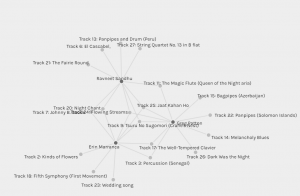
- Modularity_Class
Before I started manipulating the different inputs or rearranging nodes, this was the first dimension I brought up. It put me in a group with two other people (Erin and Ravneet) where we had a modularity agreement of 7 out of 30 songs . All three of us shared three songs together.
“Modularity is one measure of the structure of networks or graphs which measures the strength of division of a network into modules (also called groups, clusters or communities). Networks with high modularity have dense connections between the nodes within modules but sparse connections between nodes in different modules.” https://en.wikipedia.org/wiki/Modularity_(networks)#Modularity
The program had decided that the three of us had the densest connections together when looking at the entire community as a whole, with the least amount of sparse connections.
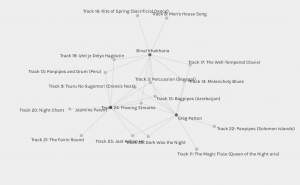
- Most Similar
I wanted to know who had the most similar playlist to me, so I then went through each source (person) and put them with me to see who I had the most connections with. Binal and Jasmine both shared six songs with me, while together we shared eight out of our ten songs together. I found this really interesting as though I do not know Jasmine, I work with Binal! Even though we talk daily (and not just about class), we never discussed our lists until after the assignment was handed in. Binal and I are quite different at work; she is a fantastic teacher with a keen scientific mind and a love for helping students while my attributes lean towards the English and Socials subjects and I don’t teach much at all now that I am in an administrative role, yet we get along really well and have collaborated on assignments for other courses very capably (at least I think so!) and she is definitely someone I would consider a good friend. So looking at this data made me wonder if maybe there is a connection between compatibility and music; maybe if I met Jasmine (Hi Jasmine!) that we would get along quite well too. This led me to my next choice…
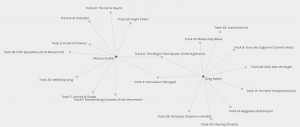
- Least Similar
Melissa Drake and I share two songs out of lists: The Magic Flute and the Senegal Percussion. Now, if I go with the assumption I made in my previous analysis, would this make Melissa and I incompatible? In this instance, I have met and worked with Melissa in another class and have found her to be a totally awesome person. But it would be interesting to sit and find out how much we have in common or how compatible our personalities are. But, I think this data needs to be taken with a grain of salt as we are really looking at a small community and you have to wonder how reliable the data is on such a small sample size.
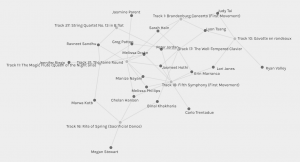
- “Classical” Music
I use the term classical loosely here, like in a record store where they put everything under certain large genre labels, but one thing I noticed right away with the Golden Record playlist was the abundance of classical pieces. By my definition of classical (European Classical) there are eight tracks of music; this is quite a lot of a playlist that is suppose to represent all the music of the Earth. There was some justification made in the podcast we listened to, that classical music is very math-like and there is a chance that extra terrestrial life may understand mathematics. (#65, Voyager Golden Record. Twenty Thousand Hertz) But that made me start to think about biases and stereotypes in regards to music. I think there is a bias in our culture that “smart, educated” people enjoy classical music (and jazz tends to get thrown in there as well), while others enjoy the “simpler” sounds of pop music (this would encompass country/hip hop/rock too). This playlist actually reinforces this bias; to be blunt, a bunch of smart scientists got together and made a playlist with eight out of twenty seven tracks coming from the classical genre. And twenty out of twenty-one students from our class chose at least one song for their playlist, and some would argue that, as we are in a Masters program, we all fall into that highly educated bracket that appreciate classical music. Interesting…
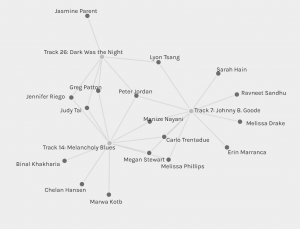
- American Culture
Examining the euro-centric bias of classical music made me want to look at another cultural assumption. Within the Golden Record playlist are three songs that could be argued as forbearers to American Jazz, Blues, and Rock music. American culture, with music being a part of it, is one of the most dominant cultures on Earth, and this influence can be seen within the curation data. Seventeen people out of the twenty-one chose either Melancholy Blues, Johnny B. Goode, or Dark Was the Night; eight people chose two songs, and one person chose all three. This was a substantial amount, but it wasn’t as big of an impact as the classical pieces had (though they did not take up as much of the playlist). How come? Could it be that these songs, as the ancestral beginnings of these music genres, sound dated and not as “valuable” to keep as others? I know myself that I found Johnny B. Goode as not the example of rock/pop that I would choose; the spacecraft was launched in the late 1970’s and there had been an abundance of examples of rock/pop that I would have thought more suitable to be immortalized (there was this small band called The Beatles I think that may have had a hit or two). Could this also show the fleetingness of rock music compared with the stalwart music of the classical genre? Do “smart scientists” always go back to the roots of a culture instead of immortalizing more modern? More food for thought.
I love how the analysis of the data has allowed for more questions and examination in regards to the choices made; this could be such a powerful tool when it comes to political or societal analysis. I think the only real drawback is making sure the community participating is big enough to mirror the results for a population.
References
https://en.wikipedia.org/wiki/Modularity_(networks)#Modularity
Episode 65, Voyager Golden Record. Twenty Thousand Hertz podcast
